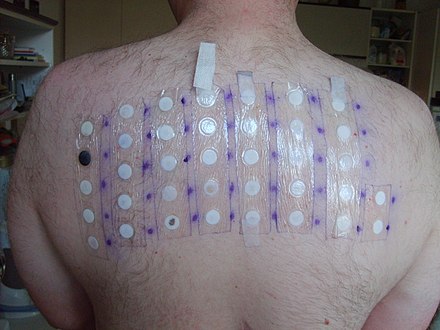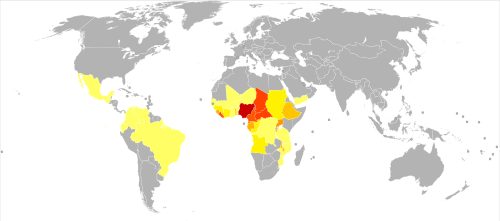Onchocerciasis
Onchocerciasis, also known as river blindness or Robles disease, is a parasitic infection caused by the roundworm Onchocerca volvulus.
This disease is primarily spread by the bites of black flies of the Simulium species, which thrive near rivers and streams. The infection can cause severe itching, skin nodules, and blindness, making it the second leading cause of blindness due to infection, after trachoma.

Cause and Life Cycle
The life cycle of O. volvulus begins when an infected female black fly takes a blood meal from a human host and ingests microfilariae. These larvae develop within the fly and are transmitted to another human when the fly bites again.
The larvae mature into adult worms in the subcutaneous tissue of the human host, forming nodules. These adult worms produce microfilariae that migrate to the skin, where they can be ingested by another biting black fly, continuing the transmission cycle.
Signs and Symptoms
Clinical manifestations of onchocerciasis are primarily due to inflammatory responses to dead or dying microfilariae. Symptoms are categorised into skin and eye symptoms:
- Skin Symptoms: These include intense itching, swelling, inflammation, depigmentation, hyperpigmentation, rash, nodules under the skin, skin atrophy, and hanging groin.
- Eye Symptoms: These include vision impairment, clouding of the cornea, light sensitivity, eye lesions, glaucoma, eye pain, and redness. The term "river blindness" originates from the severe visual impairment caused by the disease.

Diagnosis
Diagnosis is typically made by skin biopsy, where a small skin snip is placed in saline and examined under a microscope for the presence of microfilariae. If microfilariae are undetectable, the Mazzotti test may be used, where diethylcarbamazine is applied to the skin, and the presence of intense inflammation indicates infection.
Slit lamp eye exams can identify parasites in and around the eyes, and antibody tests can also aid in diagnosis.
Treatment

Treatment primarily involves the administration of ivermectin, which is given every six to twelve months to kill the larvae. Ivermectin does not kill adult worms but reduces the number of larvae released. Doxycycline can be used as an adjunct therapy to kill Wolbachia bacteria that live in adult worms, weakening the worms and potentially killing them. In some cases, nodules containing adult worms may be surgically removed.
Moxidectin, a newer drug, has shown promise in more strongly suppressing microfilariae.
Prevention and Elimination
Prevention strategies include avoiding black fly bites through the use of insect repellents and proper clothing. Large-scale control programmes, such as the Onchocerciasis Control Programme (OCP) and the African Programme for Onchocerciasis Control (APOC), have been successful in reducing transmission through mass drug administration and insecticide spraying.
Countries like Colombia, Ecuador, Mexico, and Guatemala have successfully eradicated the disease. Efforts continue globally to eliminate onchocerciasis, particularly in Africa, where the burden remains highest.
Epidemiology

As of 2017, approximately 21 million people were infected with onchocerciasis, with the vast majority of cases occurring in Africa. The disease affects rural agricultural communities near rivers, significantly impacting their socio-economic development. Efforts to map and treat endemic areas continue, with the goal of ultimately eradicating the disease.
Self-assessment MCQs (single best answer)
What is another name for onchocerciasis?
Which organism causes onchocerciasis?
What is the primary vector for the transmission of onchocerciasis?
Where do black flies that spread onchocerciasis primarily thrive?
Which drug is commonly used to treat onchocerciasis by killing the larvae?
What condition does onchocerciasis primarily cause in the eyes?
Which test involves applying diethylcarbamazine to the skin to diagnose onchocerciasis?
What is the purpose of using doxycycline in the treatment of onchocerciasis?
In which regions has onchocerciasis been successfully eradicated?
What is the main strategy for preventing onchocerciasis in endemic areas?
Dentaljuce
Dentaljuce provides Enhanced Continuing Professional Development (CPD) with GDC-approved Certificates for dental professionals worldwide.
Founded in 2009 by the award-winning Masters team from the School of Dentistry at the University of Birmingham, Dentaljuce has established itself as the leading platform for online CPD.
With over 100 high-quality online courses available for a single annual membership fee, Dentaljuce offers comprehensive e-learning designed for busy dental professionals.
The courses cover a complete range of topics, from clinical skills to patient communication, and are suitable for dentists, nurses, hygienists, therapists, students, and practice managers.
Dentaljuce features Dr. Aiden, a dentally trained AI-powered personal tutor available 24/7 to assist with queries and provide guidance through complex topics, enhancing the learning experience.
Check out our range of courses, or sign up now!


